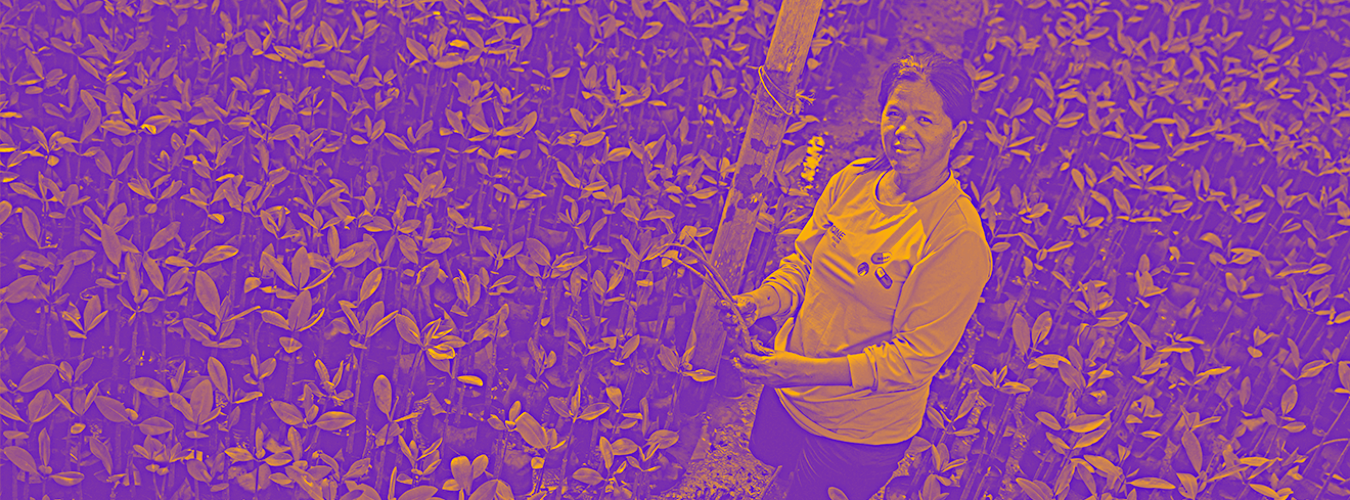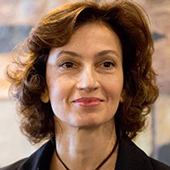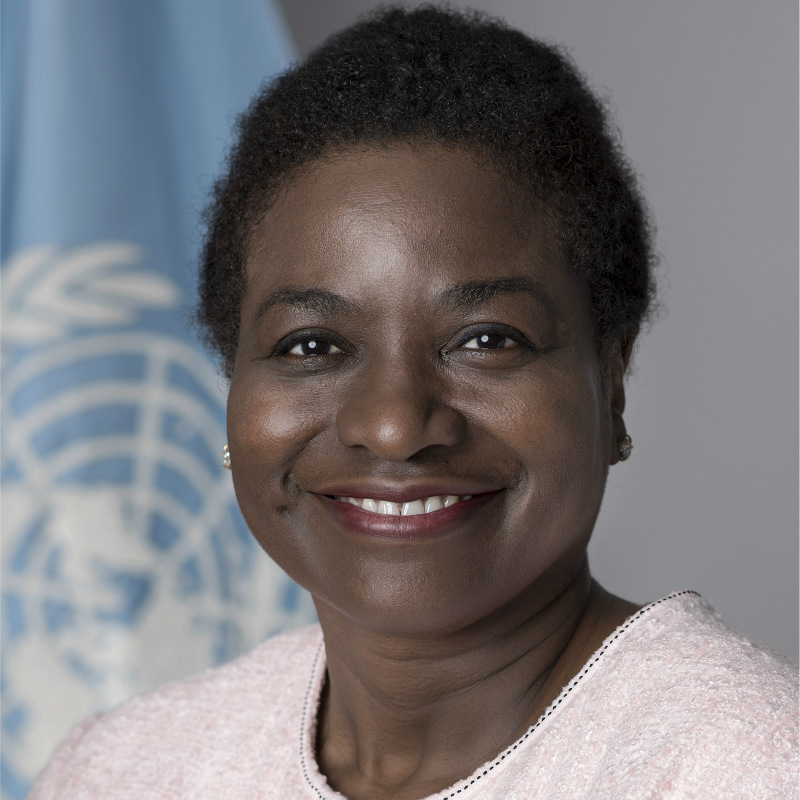
各方致辞
2024年秘书长致辞
值此国际妇女节之际,我们表彰世界各地的妇女和女童,我们赞扬她们在争取平等的斗争中取得的一切成就。
为消除各种阻碍,铲除陈规定型观念,推动迈向更加公正和平等的世界,妇女和女童取得了重大的成就。
然而,她们也面临着各种巨大的障碍。数十亿妇女和女童遭受边缘化、不公正和歧视待遇,而暴力侵害妇女行为的持续蔓延则使人类蒙羞。
我们的世界仍然反映了几千年来男性主导的权力关系。
妇女所取得的进步正受到攻击,妇女权利遭到强烈抵制。
按照我们目前的速度,男女法律平等尚需约三百年才能实现。
我们必须加快行动。
值此国际妇女节之际,我们与那些为自身权利而奋斗的妇女和女童团结一致,我们承诺加快取得进展。
今年“投资于妇女”的主题提醒我们,结束父权制需要有资金的承诺。
我们必须支持处在第一线的妇女组织。
我们必须投资于旨在结束暴力侵害妇女行为的方案,推动妇女在经济、数字技术、建设和平和气候行动中的参与和领导。
这一切都取决于为可持续发展释放资金,使各国有资金投资于妇女和女童。
我们还需要增加商业、金融、中央银行和财政部门中的妇女领导人数。这有助于推动对满足妇女和女童需求的政策和方案的投资。
实现妇女平等权利是通往公平、和平、繁荣社会的一条行之有效的道路。这对我们大家都有好处。
让我们共同采取紧急行动,实现妇女平等权利。
谢谢大家。
安东尼奥·古特雷斯
我们必须支持处在第一线的妇女组织。我们必须投资于旨在结束暴力侵害妇女行为的方案,推动妇女在经济、数字技术、建设和平和气候行动中的参与和领导。"
安东尼奥·古特雷斯
视频致辞
2024年联合国妇女署执行主任致辞
I will begin on this International Women’s Day with a moment of reflection for all the women and girls killed in wars and conflicts that are not of their making.
Wars and conflicts are eroding the achievements of decades of investments in gender equality and women’s empowerment. From the Middle East, to Haiti, to Sudan, Myanmar, the Sahel, Ukraine, Afghanistan, and elsewhere in the world, women pay the biggest price of conflicts.
Conflict is inherently violent, but for women and girls ever more so, including in sexual and gender-based ways. This is intolerable. No woman or girl anywhere, ever, should experience sexual violence or any form of violence. UN Women, alongside everyone here, condemns it unequivocally.
The need for peace has never been more urgent. We salute women everywhere who strive to bring peace every day, who are human rights activists, who are human rights defenders, who lead and fight for change.
This year’s International Women’s Day sees a world hobbled by confrontation, fragmentation, fear, and, most of all, inequality.
According to the analysis of UNFPA and academic partners, $222 billion in new investment would secure an end to preventable maternal deaths, eliminate unmet need for family planning, and safeguard women and girls everywhere from gender-based violence and harmful practices by 2030. This would transform the lives of millions.
Persistent poverty gaps continue to exist worldwide, and women bear an increasingly heavy burden. One in every ten women in the world lives in extreme poverty. Poverty has a female face.
Men own 105 trillion dollars [USD] more wealth than women. They dominate the corridors of power.
And the pushback against gender equality is well resourced and powerful, fuelled by anti-gender movements, de-democratization, restricted civic space, a breakdown of trust between people and state, and regressive policies and legislation.
We all feel this pushback acutely. Our values and principles have never been as challenged as they are today.
I thank all of you for lending your energies to this struggle, to the cause of women’s rights and gender equality, and I thank you all for joining us in pushing forward against the pushback.
This year’s International Women’s Day calls us all to invest in women and girls and to accelerate progress.
It is only by investing in women and girls that we will meet the challenges we face, be they economic-, conflict- or climate-related.
Investing in women and girls is indisputably the best pathway to the achievement of the Sustainable Development Goals, to peace and security.
When more women are economically empowered, economies grow.
Where women are equally represented in government, governance thrives.
Where women are free to live their lives without the perpetual threat of violence, families flourish, and businesses benefit.
Where women have a bigger say in peace processes, peace is found sooner and is more durable.
But in spite of these clear facts, we continue to stubbornly invest in weapons more than we invest in women and girls.
We continue to say gender equality can be postponed for “later”, as we watch the world fall further off track, and even “later” is postponed.
In the coming months and year, we have a collective opportunity to recommit ourselves to gender equality. The Summit of the Future presents an opportunity to centrally place gender equality across discussions on development, financing, technology, and peace and security. The thirtieth anniversary of the Beijing Platform for Action next year has the potential to be a watershed moment for increased and accelerated action to make truth of the promises made 29 years ago. I welcome the Secretary-General’s announcement of the Gender Equality Acceleration Plan. Please count on UN Women as your partners in this.
The International Women’s Day this year has a call. And this call is clear and compelling. For every woman and girl, we ask that we finally make the best investment we can: financing gender equality and unlocking its dividends for all. More than 100 million women and girls could be lifted out of poverty if governments prioritized education, healthcare, fair and equal wages, and expanded social benefits. We know that when women raise their voices it is for equality, for their rights and for the rights of others, for peace and justice for all. They fight to leave a better world behind them for all the people and for our shared planet.
On International Women’s Day we elevate their voice. We elevate their cause, and our cause. We commit to affording it the resources it deserves and demands.
Allow me before I end to echo the call of the Secretary-General, the President of the General Assembly, the Chair of the Commission on the Status of Women: We need a humanitarian ceasefire in Gaza now. More than 9000 women have been killed in Gaza, and this must stop. We cannot return to a path to peace without justice for all survivors of this conflict—and I say all survivors of this conflict—and without an end to the indiscriminate violence in Gaza.
I began my remarks today with a moment of reflection. I end my remarks with a call for all of us to be the light that brings hope and that accelerates progress towards an equal, sustainable, and peaceful future. For all people. For every woman and for every girl, everywhere. I know that together, it is within our reach.
I thank you.
Sima Bahous
It is only by investing in women and girls that we will meet the challenges we face, be they economic-, conflict- or climate-related."
Sima Bahous
Executive Director, UN Women
2024年联合国教科文组织总干事致辞
性别平等是一个简单的概念:是坚信女性应享有与男性相同的权利、机会和知识;是坚信女性同样可以为社会以及为解决社会问题作出贡献;是承诺打破长久以来阻碍女性发展的障碍。
然而,尽管性别平等如此简单,实现起来却难上加难。今天,世界上没有一个国家可以宣称实现了性别平等。而按照目前的速度,需要近300年时间才能让所有国家实现这个目标。与此同时,根据教科文组织的数据,在本十年末,因人工智能而失去工作的女性将比男性更多。到2050年,气候危机将使约1.6亿妇女陷入贫困。
为了打破妇女面临的障碍,教科文组织将性别平等作为其行动的总体优先事项。我们肯定女科学家、女艺术家、女记者、女教育工作者和女运动员作出的宝贵贡献。我们致力于确保所有妇女和女童都能获得应有的机会。并且,每年3月8日,我们庆祝国际妇女节,以提高对这些问题的认识。
今年国际妇女节的主题是“投资于妇女,加速进步”。这意味着,需要在一连串全球性的关切和危机面前,制定、资助和实施变革性解决方案,以促进性别平等和可持续性。教科文组织与其伙伴携手合作,在其所有任务领域开展这项工作。
首先,为了更好地了解性别歧视对经济和社会的负面影响,教科文组织制定了一个基于性别的复原力框架“赋权妇女造福社会”。该框架强调不仅需要在劳动力、创新和体育运动方面缩小性别差距,在领导力和决策方面也应如此,这与我们今天推出的新播客“领导力促进平等”(Leadership for Equality)完全契合。
在教育领域,我们通过向妇女传授提高其经济和社会自主权所需的技能来增强妇女权能,我们的旗舰计划“她的教育,我们的未来”就是其中一例。我们将在今年3月7日发布的一部纪录片中,讲述这一举措如何改变了四个女孩的生活。
我们还致力于确保妇女和女童能够在科学领域充分发展,尤其是考虑到根据《教科文组织科学报告》,妇女仅占所有研究人员的三分之一。2022年,为打破科学、技术、工程、数学(STEM)领域的障碍,我们通过导师制、榜样计划及职业发展计划,为5550 名妇女和女童提供了支持。此外,自 1998年以来,我们已通过欧莱雅—教科文组织“妇女与科学”计划,表彰了全世界140多个国家的4200多名才华横溢的女科学家。
在创意产业,教科文组织也在努力为妇女创造职业机会。例如,在华特迪士尼公司的支持下,我们与“动画界女性”(Women in Animation)组织及其2024年“故事x女性”计划合作,让十几名女动画师(特别是来自非洲的女动画师)有机会在法国安纳西国际动画电影节上推介项目。
此外,教科文组织特别关注女记者面临的困境。根据我们的研究,73%的女记者面临网络暴力。我们正在与政府、法官、数字平台和媒体合作,致力于创造更加安全的工作环境,并打击网络骚扰。
实现妇女赋权,仍然是人类面临的最大挑战之一,但同时也是让人类潜力充分得到发挥的巨大机遇。值此国际妇女节,教科文组织呼吁立即采取行动,从现在开始进行范式转变。
奥德蕾·阿祖莱
2024年人口基金执行主任致辞
A peaceful and prosperous future depends on the empowerment of women and girls. Thirty years ago, at the International Conference on Population and Development in Cairo, 179 countries agreed that this was the right thing to do and the necessary path forward for sustainable global development.
Since then, dedicated investments in the health and rights of women and girls have improved – and saved – millions of lives. Today, one third fewer women are dying from preventable complications of pregnancy and childbirth than in 2000. The number of girls giving birth while still teenagers has also dropped by a third over the same period. And the number of women using modern contraceptives has doubled since 1990.
Yet while broad trends show major steps forward in the pursuit of gender equality, they do not reflect the lived experiences of millions who continue to be left behind – largely due to persisting gender inequity, often in combination with other forms of discrimination. Women and girls with disabilities, of ethnic and racial minorities or identifying as LGBTQI+ are still prevented from realizing their sexual and reproductive health and rights. For those caught up in conflicts and climate disasters, family planning and gender-based violence response services typically crumble just when they are most critical.
Achieving a brighter future for everyone, whoever and wherever they are, demands swift, sustained and cross-cutting support for and investment in women and girls – everywhere.
The good news is we know what works and that it’s a great investment.
According to the analysis of UNFPA and academic partners, $222 billion in new investment would secure an end to preventable maternal deaths, eliminate unmet need for family planning, and safeguard women and girls everywhere from gender-based violence and harmful practices by 2030. This would transform the lives of millions.
Girls who are not married off as children have a greater chance of finishing school and securing employment, translating into trillions of dollars in economic benefits for society. Increasing women’s participation in the workplace raises their lifetime earning potential, and could boost per capita GDP by nearly 20 per cent on average. Businesses that subsidize the sexual and reproductive health of their workforce can increase productivity by up to 15 per cent and reduce talent attrition by as much as 22 per cent. When we invest in women and girls, everyone gains.
Yet, despite these clear benefits, investments are still nowhere near enough: In 2017, less than 1 per cent of global aid for gender equality and women’s empowerment went to women’s organizations. In 2022, less than 1 per cent of global overseas aid went towards stopping gender-based violence. Only 1 per cent of global health-care research is invested in female-specific conditions beyond oncology. Women and girls deserve better.
We owe a great debt of gratitude to the women around the world who have led the march towards gender equality in their families, homes, workplaces and communities. Women like Safia*, a survivor of female genital mutilation who lost one daughter to the practice and refused to subject her second daughter to it, and 15-year-old Ngoma*, who is raising awareness about sexual and gender-based violence and rallying her community to defend the rights of their girls.
We owe women and girls real investments, such as supporting secondary education, championing their leadership in new tech, backing their own innovations against violence, and opening up more platforms to hear their voices and help them save lives.
Only by investing in the societal, economic and political inclusion of women and girls will we strengthen our social fabric and create something truly beautiful: A future that works for all.
Dr Natalia Kanem
Only by investing in the societal, economic and political inclusion of women and girls will we strengthen our social fabric and create something truly beautiful: A future that works for all."
Dr Natalia Kanem
Executive Director, UNFPA




